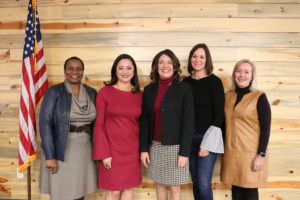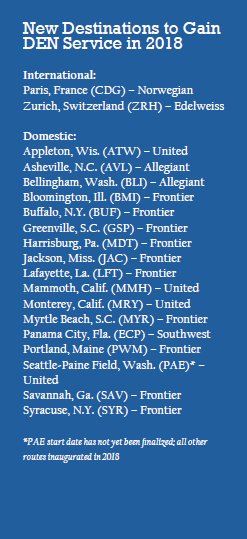DENVER – The Denver Metro Chamber of Commerce today announced the appointment of Raymond H. Gonzales as executive vice president of the Chamber and president of the Metro Denver Economic Development Corporation (EDC). He will begin Dec. 1.
Raymond H. Gonzales as executive vice president of the Chamber and president of the Metro Denver Economic Development Corporation (EDC). He will begin Dec. 1.
Gonzales, who currently serves as county manager of Adams County, brings more than 24 years of senior level experience encompassing nearly every level of government administration. He is known as a progressive and innovative economic development professional with a successful track record for attracting new industry, business and investments. Adams County ranked #1 in the nation in job growth out of 355 of the largest U.S. counties from June 2018 to June 2019.
"Emerging from a pandemic, we need forward-thinking and visionary leadership to continue driving economic growth in every corner of Metro Denver," said April Giles, Metro Denver EDC Executive Board co-chair and Fitzsimmons Innovation Community vice president of business development. "Raymond has proven that he understands the complexities of creating local partnerships, crafting international economic development agreements, and building an inclusive culture of success at the highest levels."
Gonzales will oversee the Metro Denver EDC in its work to unite more than 70 cities, counties and economic development agencies in the nine-county Metro Denver region to promote economic prosperity, lead business attraction and retention efforts and advance the region's business brand, The Elevation Effect.
"Raymond is an outstanding leader who brings the perfect portfolio of experience and accomplishments to these critical roles in our organization," said J. J. Ament, president and CEO of Denver Metro Chamber of Commerce, who oversaw the Metro Denver EDC before assuming his role leading the Chamber in September. "From our smallest startups to our enterprise companies, Raymond’s commitment to community will ensure that everyone benefits from the great jobs and opportunities a strong economy creates.”
In September after two years of intensive research, the Metro Denver EDC unveiled “The Elevation Effect.” The brand will help the region retain its current workforce and businesses and communicate why people and companies located elsewhere should choose Metro Denver as the place where they want to move and grow. It will be used by many industries in the Metro Denver region including economic development offices, higher education partners and human resources executives.
"I am honored to accept this position with an organization that I have worked collaboratively with and admired for decades," Gonzales said. "Whether recruiting international aerospace companies or working to streamline development review processes, I have worked throughout my career to increase opportunities in our communities while creating a business-friendly environment that benefits our job creators and this region that we are proud to call home."
In 2019, Gonzales was named "County Manager of the Year" by the Colorado City/County Management Association. He also led successful international economic development missions where he helped secure agreements with aerospace companies from Japan, New Zealand and the United Kingdom. He established the Adams County People & Culture Services Department, which empowers the county’s 2,500 employees to have a personal impact, influence and inspiration regardless of title of designation.
“While we are sad to see Ray leave Adams County, we certainly understand why the Metro Denver EDC would be interested in having him lead their organization,” said Adams County Board Chair Eva Henry. “Ray is a dynamic leader who has accelerated the level of professionalism in every department of the county. We wish him continued success on his professional journey.”
Before serving as county manager in Adams County, Gonzales was the president and CEO of the Brighton Economic Development Corporation, vice president of business and economic development for SOS Employment Group and deputy cabinet secretary of labor under New Mexico Gov. Bill Richardson. He also served on New Mexico’s Economic Development Commission.
He is vice president of the Mountain Plains region of the International City/County Management Association’s Executive Board, president of the Local Government Hispanic Network Board of Directors, co-chair of the Rocky Mountain Partnership’s Community Leaders Council and vice chair of the Scientific and Cultural Facilities District.
Gonzales is a third-generation Coloradan from Brighton. He holds a Bachelor of Science in Accounting from the Regis University College of Business and Economics.
In addition to welcoming Trey Rogers as the chair of the Denver Metro Chamber, its family of organizations – the Colorado Competitive Council, Denver Metro Chamber Leadership Foundation, Denver Metro Small Business Development Center and the Metro Denver Economic Development Corporation – all welcomed new board leadership. They’re part of our collective work to make Colorado a great place to live and do business. Get to know these incoming leaders.
Colorado Competitive Council Chair
Beverly Razon
Senior Vice President of Public Affairs COPIC
 After being engaged with C3 for more than 10 years, “I am excited and humbled at the opportunity to support [C3 Director] Lauren Masias in leading it forward,” Razon said.
After being engaged with C3 for more than 10 years, “I am excited and humbled at the opportunity to support [C3 Director] Lauren Masias in leading it forward,” Razon said.
And, Razon is ready to get to work: “This unprecedented time presents unprecedented opportunity for C3 to collaborate with, support and represent businesses across the state at the Capitol. This is critical to ensuring Colorado’s policies work to lift up the recovery of our economy in order to keep our citizens working or get them back to work. C3 is well-positioned to represent this statewide voice as we work through thoughtful, balanced policy with our elected leaders on the many issues we know are ahead of us.”
Denver Metro Chamber Leadership Foundation Board Chair
Anthony Graves
Principal, GRAVES CIVIC SOLUTIONS, LLC
 A longtime speaker at the Leadership Foundation’s Leadership Denver program days, Graves has engaged more deeply with the organization as a board member since 2015. A member of Mayor Michael B. Hancock’s cabinet for seven years, Graves recently launched a public affairs and economic development consultancy, and he’s seen an outpouring of support – something that makes doing business in Colorado special: “I love the focus on building long-term, authentic relationships and the personal interest that business leaders take in one another,” Graves said.
A longtime speaker at the Leadership Foundation’s Leadership Denver program days, Graves has engaged more deeply with the organization as a board member since 2015. A member of Mayor Michael B. Hancock’s cabinet for seven years, Graves recently launched a public affairs and economic development consultancy, and he’s seen an outpouring of support – something that makes doing business in Colorado special: “I love the focus on building long-term, authentic relationships and the personal interest that business leaders take in one another,” Graves said.
But with dual challenges of combatting coronavirus and racial injustice, Graves said the Leadership Foundation, which works to educate and inspire leaders to make a difference in the community, is critical: “This confluence of crises has underscored the importance of developing a pipeline of leaders in our society who can address the intractable challenges of today and prepare for the unknown challenges of tomorrow,” he said.
Denver Metro Small Business Development Center Board Chair
Rob Smith
Executive Director of Rocky Mountain MicroFinance Institute
 Smith returns as Denver Metro SBDC Chair, a role he’s held since 2018: “Ensuring small business has a voice at the table is incredibly important to me.”
Smith returns as Denver Metro SBDC Chair, a role he’s held since 2018: “Ensuring small business has a voice at the table is incredibly important to me.”
“Colorado has a ‘go for it’ spirit,” he said. “If we don’t know how to do it, we figure it out (and we do a really good job at it). There has been a lot of damage done as a result of COVID-19 and the waves of uncertainty and fear it brings, and we’ll see a fundamental re-orientation of our economy as a result. We’re an entrepreneurial state, through and through, and I’m excited to support our path forward through the incredible adaptability and resilience of our small business community.”
Metro Denver Economic Development Corporation Incoming Executive Committee Co-Chair
April Giles
Vice President of Business Development for the Fitzsimons Innovation Community
 Coloradans are up for any challenge, and that’s why Giles loves living and working here: “Time and time again when we call on our community to step up, lead, solve, inspire, mentor – you name it – Coloradans will join in to contribute,” she said.
Coloradans are up for any challenge, and that’s why Giles loves living and working here: “Time and time again when we call on our community to step up, lead, solve, inspire, mentor – you name it – Coloradans will join in to contribute,” she said.
And, Giles has seen that in action at the Metro Denver EDC. “Issues, such as workforce development, transportation, housing, arts and culture, are at the forefront of their work. Metro Denver EDC intuitively understands that by optimizing complementary economic development ‘systems’ we invest in long-term sustainable results,” she said.
And, she’s proud to serve an industry working on the frontlines to stop the pandemic: “They’ve rolled up their sleeves to serve. Colorado has a number of bioscience companies and hospital systems with high national regards for their work to provide diagnostic tests, leadership on vaccine clinical trials and their daily care of COVID-19 patients.”
Metro Denver Economic Development Corporation Incoming Board of Governors Co-Chair
Paul Washington
Market Director at JLL
 In the year ahead, Washington said he sees a unique opportunity “to brand the Denver region as a thought leader in how it will operate and compete in a post-COVID virtual economy.”
In the year ahead, Washington said he sees a unique opportunity “to brand the Denver region as a thought leader in how it will operate and compete in a post-COVID virtual economy.”
Washington first got to know the Metro Denver EDC as the executive director of Denver’s Office of Economic Development, where he saw how the Metro Denver EDC’s approach – of collaboration and coordination among the companies and municipalities from across the metro area – “distinguishes the Denver region from its competitors.”
And it’s that attitude – “the general culture that people are here to help and that we are in the process of really defining ourselves” – that Washington says makes Colorado a great place to live and work. “This allows for everyone to participate in the legacy of this state,” he said.
There’s no denying it – COVID-19 has impacted all of us. But underlying all these changes are the values that make Colorado unique – these values helped us build the strongest economy in the nation and these values will help us get through this crisis as well.
In Colorado, we work together. We’ve seen businesses pivoting from making ski gear or window coverings to manufacturing personal protective equipment, restaurants making meals to deliver to health care workers and that can be delivered to your door without contacting another person, and financial experts volunteering their time to help small businesses access available resources.
At the Chamber, we have had two priorities throughout this time:
The Chamber family is here to support you always – and especially during challenging times. Here are some of the ways we’re working for you.
Collaborating with Federal, State and Local Leaders
Our team is working daily with federal, state and local officials to represent the business community’s voice in decisions being made around COVID-19. To help us do this, we’re asking you to take a survey on policy that could further assist you and your employees during this time or policy that could impact your efforts to keep employees on payroll and your organizations viable. Take the survey.
On that note, a business coalition has come together to urge Governor Polis to work with the General Assembly to give Colorado counties the authority and flexibility to adjust or delay property taxes during this unprecedented time. Read the letter being submitted and sign on if your organization is in support.
Supporting Small Businesses
Our Denver Metro Small Business Development Center (SBDC) is working closely with partners who can advise small businesses on how to respond to this crisis. We can help businesses access the federal CARES Act and assist with disaster loan applications, long-term planning, insurance navigation, physical and economic loss estimations, business preparedness and more. Visit the Denver Metro SBDC website for more information at denversbdc.org or contact them at info@denversbdc.org.
Honoring Our Mission-Critical Companies
Colorado is home to a number of companies offering essential services during the COVID-19 pandemic. These companies safeguard our national security, put food on our families’ tables, create life-saving medical drugs and devices, keep the lights on and the internet reliable, and work to ensure the stability of our financial system. Their frontline contributions keep us safe, fed and connected. But even more than that, their efforts are helping to keep the Colorado economy moving forward. So, we want to thank these businesses and highlight their important work. Join us in honoring our mission-critical companies specifically, and also tell us what you’re doing to keep the economy on track by using the hashtag #workingtokeepusworking.
Launching the COVID-19 Business Resource Center
Our team has worked to curate a range of pandemic-related materials – offering businesses of all sizes and across industries, as well as workers, a one-stop COVID-19 Business Resource Center at denverchamber.org/covid. This includes a list of resources for our workforce – from filing unemployment and securing child care to finding job opportunities and accessing food banks.
Coming Together Virtually for Our COVID-19 Webinar Series
As we all navigate our new remote workplace culture, the Chamber is offering a series of webinars for you and your employees on a variety of topics, including policy, small business resources and unemployment.
The next webinar on “Managing Employees During COVID-19” is Thursday, April 16, from 11 a.m. to noon. Register for the webinar.
Also see the recordings of past webinars and the upcoming schedule at denverchamber.org/covidprograms.
Helping Business Engage in Community Response
B:CIVIC is stepping up its efforts to empower organizations and their people to do more for their communities. Representing the leaders in corporate social responsibility, B:CIVIC has launched a COVID-19 resource website to share best practices from companies taking a stand through grantmaking, crisis communications, nonprofit support and virtual volunteering. The team also is hosting regular webinars where community leaders are sharing stories of impact, current trends and community updates. Learn more at bcivic.org/covid-19-best-practices-tools.
Leading in Crisis
There’s a saying that the true test of leadership is how we respond in crisis. The Denver Metro Chamber Leadership Foundation continues its work to educate and inspire leaders as our community faces this current crisis. Our team has put together virtual resources to continue Leadership Denver, Impact Denver and other programs, and we are launching a new series called Virtual Voices for our alumni. Learn more at denverleadership.org/events/.
Continuing Our Important Recruitment Work
Our economic development efforts continue. The Metro Denver Economic Development Corporation is still recruiting new companies and working with existing ones as they explore opportunities to move to or expand within metro Denver.
While the road ahead remains uncertain, we know that we will get through this. I’m already hearing from several of you who are preparing for the next phase – reentry back into the workplace. We will share best practices and things to consider in future webinars on this topic
Please tell us what else we can do to support you now and help prepare you for the future.
Kelly Brough is the president and CEO of the Denver Metro Chamber.
On Entrepreneurship, Mentors and Being the Only Woman in the Room
“Apparently today is the day women took over.”
That comment from Chamber President and CEO Kelly Brough was greeted by laughter and cheers as she introduced four women who run their own companies and lead at the Chamber and its affiliates – something that’s a first in the organization’s history.

Those women are Denise Burgess, Toti Cadavid, Carla Dore and Tara Dunn.
Burgess chairs the Chamber board of directors and in 2002 took over her family’s heating and cooling business and transformed it into an international construction management firm, Burgess Services.
Cadavid champions small business on the Denver Metro Small Business Development board of directors and runs her own small business – U-Fulfilled, a coaching and leadership development company.
Dore co-chairs the Metro Denver Economic Development Corporation’s Executive Committee, focused on growing jobs in the region, something she knows a thing or two about as president and CEO of office furniture dealer Workplace Resource.
Dunn was the 2017-18 board chair for the Denver Metro Chamber Leadership Foundation and has been an entrepreneur twice. She helped found Great Divide Brewing Company, and most recently she’s launched her own corporate law firm, HighMark Law.
They shared what they’ve learned from leading in business and the community – and how businesses can work to give more women access to leadership opportunities at a time when just one in five women holds a c-suite role and just one in 30 is a woman of color.
Brough: You all run your own companies and there are risks you take as entrepreneurs. What was that like for you, and did you find it different as a woman?
Burgess: Running my [family’s] business still felt risky. When you’re in construction you only get 20 percent of the jobs you apply for in the line of work I’m in, so 80 percent of the time you fail.
Cadavid: I think being an entrepreneur means risk. There’s nothing we do that isn’t risky. We hire an employee, it’s risky. We go for the wrong client, or the right one, and it’s a risk. I learned watching my mother. She’s a serial entrepreneur. I saw her succeed and fail, succeed and fail. I had in my blood knowing that even if you fail you can always succeed again.
Dore: My father owned his own business, too. I didn’t want to be in the family business and I thought I would want to be the furthest from owning my own business. Once you’re in the thick of it and you’re clear on what direction you want to go and you know your purpose is, it doesn’t matter if you’re a woman. I’m in a very male-dominated business as well. Before I bought the business from Herman Miller I was the only woman president of a dealership in North America.
Brough: My mom told me when I was little to understand the difference between loss and regret. A loss is you go and start your company and it doesn’t work, you fail and try again until it works. A regret is when you don’t ever try. Your stories are reinforcing my mother’s wisdom to go for the loss.
Dunn: I ended up deciding to go to law school with two five-year-olds to financially diversify our family. I worked my way out of the brewery job and I’ve practiced law at really big law firms and also at a publicly traded company. I found myself thinking about what I was going to do next and someone suggested starting my own corporate law practice. I was like, “Hand me a paper bag, please,” because the thought of doing that was so hard. It was really hard to get brave enough to do this, but I realized the worst thing that would happen is I’m going to be looking for a job.
Brough: I do think the fear of failure helps you drive the success. OK, let’s talk about mentors – who has helped you in your careers?
Cadavid: When I launched the agency back in 2002, I said who’s going to be my mentor? I researched the most successful Latina entrepreneur. That was Ana Quintana. I wrote her an email and she said, “Bring me a business plan.” It pushed me to come up with everything. I went and over the years we’ve become very good friends. Because my mom had been an entrepreneur many times over, any time I was in a risky position, I called her. She is the most amazing, business savvy coach I have ever had.
Burgess: Mine was my dad, but I also looked out in the landscape. I was told I had to meet Barb Grogan, the first female chair of the Chamber. She owned Western Industrial and she was in construction years before I was, so she’s still a mentor today. She always says to take a step back and look at it in a different way.
Dunn: My mom was a high school algebra teacher when my dad was in the Navy and she had kids and became a stay-at-home mom. In her 30s, out of nowhere, she decided she was going to enroll in a master’s program at the Colorado School of Mines. She got her PhD and graduated at 40 with a 4.0. Then she became the CFO of a major oil and gas company that she and the CEO took public when I was a teenager. That was such an amazing model for me. I didn’t even realize how much it was in my blood … when something needs to be different, you do something different. I call her about all kinds of wicked business problems.
Brough: You just told every working mom there are a lot of ways to model for your children – even though there are losses in that decision, there’s a great gift that you’re giving your kids.
Dore: Early on, I started very entry-level at the company I now own. I had a very important client who owned her own business and we just really connected. She to this day is a really important client, but I probably learned more from her about being comfortable with the risk. Once I earned her business it was great to have her as the person I could call.
Brough: Let’s talk about women in executive roles: Let’s talk a little bit about how we change those numbers.
Cadavid: It starts with something as simple and as difficult as believing we can. Really big things in life are only achieved when you believe you can do it. It also requires us to be conscious. Sometimes we can lend a hand and bring somebody in, but sometimes we have to push.
Brough: Was there someone in your career who said you’re capable of doing more?
Dore: For me it was my dad. It was, “You will find your path and you will succeed because you can do whatever you want.” You find those people in your life that have that same demeanor. You go towards those people who are going to build you up. It makes a big difference.
Brough: Being the only woman in the room is hard, too.
Cadavid: It’s about what you believe about yourself. If we are able to grab to that little piece that says you’re here because you belong. There’s a reason you were invited to be at this table, so can you just bring out the best in you instead of all the fears? When I mentor people that’s what I say to them. We can see other people’s talents and gifts, and sometimes we cannot see our own.
Brough: What one piece of advice do you have for others?
Dunn: I think that work-life balance is really more about prioritizing things in your life. I don’t think you’re balancing all things in the same way all the time. I made a list about five or six years ago of the five things that I thought were most important for me to be doing. They’re related to my work, my family, taking care of myself, and one of the things I realized is that at different times one thing might be getting 90 percent of my energy. If you can get comfortable that not everything gets equal attention all the time, you can give yourself room. The one that never changes is that taking care of myself always has to be number one.
Cadavid: I spent 20 years of my life going after success that was decided by society or somebody else and making myself really miserable. It wasn’t until I decided what success was for me that I stopped everything. Success over time changes, but we should always know what success looks like for us.
Burgess: If I don’t prioritize me, I’m not able to give anything. I learned that in my 40s. I would say to really take care of yourself. It’s really hard to give of yourself if you’re not taking care of yourself.
Dore: Find those people that will give you honest, objective feedback, because it is how you grow. You’ve got to find those people who you trust. The other thing I’d say is learn the difference between how important it is to be effective versus being right – they’re two big differences and we get confused about that all the time.
Brough: Part of living is discovering ourselves, and we know who that person is when we’re in our 20s but don’t let them out. Let that person out, because I do think greater success comes faster and is much more rewarding when we do.
Sara Crocker is the communications manager for the Denver Metro Chamber.
As a major asset to our region, it was great news to learn that Denver International Airport (DEN) was ranked as the best large airport in the country according to the Wall Street Journal. DEN scored high in the categories of reliability, value and convenience. We know business and leisure travelers alike value DEN’s accessibility and growing number of non-stops flights around the country and the world.
“We are extremely pleased to know that the Wall Street Journal ranked us as the top large U.S. airport when it comes to overall passenger experience,” said airport CEO Kim Day. “Our airlines have voted with their robust growth, and this ranking is additional validation of our overall vision and execution. We are constantly looking for ways to improve the passenger experience from our canine therapy program to new shops and restaurants, events on our plaza, nursing rooms, reserved parking ... and our hard-working employees make it all happen.”
The rankings scored the 20 largest U.S. airports in 14 categories, from on-time reliability to longest walk. The rankings are designed to reflect what matters most to travelers, including categories like security-line wait times, Wi-Fi speed, average Yelp scores for restaurants, average fares, Uber cost to the local convention center, rental-car taxes and fees, number of nonstop destinations and market dominance of the largest airline.
“DEN is one of our most important partners and regional assets, providing more than $26 billion to the Metro Denver region’s economy annually,” said Metro Denver EDC CEO J. J. Ament. “The team at DEN has done a fantastic job of making our airport a leader in innovation and connectivity, and this honor is affirmation of their vision and leadership in global aviation.”
DEN has a strong focus on the passenger experience and providing passengers with amenities to make their visit to the airport as comfortable as possible, including fast and free Wi-Fi, nursing rooms and pet relief areas on every concourse; diverse and elevated concession and retail options; and free events like mini golf and ice skating on the DEN plaza.
In 2017, DEN served 61.4 million passengers and is on pace for another record-setting passenger year. Currently, 24 airlines provide nonstop service to more than 200 destinations including 26 international cities in 12 countries. Each day, DEN serves more than 1,600 flights and on average 168,000 passengers per day.
Article written by the Metro Denver EDC.
With the launch of two new international and 17 U.S. flights this year, Denver International Airport (DEN) now offers 200 nonstop global destinations – the first time in its aviation history. And, DEN has the most domestic destinations of any airport in the country.
 “The Metro Denver region's success attracting and scaling companies relies on our impressive network of domestic and international destinations from Denver International Airport,” said Metro Denver Economic Development Corporation CEO J. J. Ament. “Within four hours, our business travelers can reach virtually any U.S. destination with multiple flights and carriers to choose from.”
“The Metro Denver region's success attracting and scaling companies relies on our impressive network of domestic and international destinations from Denver International Airport,” said Metro Denver Economic Development Corporation CEO J. J. Ament. “Within four hours, our business travelers can reach virtually any U.S. destination with multiple flights and carriers to choose from.”
The Metro Denver EDC works with DEN to attract domestic and international flights to keep Colorado connected to the world.
Its destination growth means more competition from carriers, keeping airline ticket prices lower than the rest of the country, on average: DEN’s average one-way domestic fare is $138. That’s 19 percent below the U.S. average of $170. In fact, Denver’s average fare has declined 5 percent over the past year, compared to a less than 2 percent average decline for all U.S. airports.
And, those low fares help to stimulate travel demand; DEN’s domestic market has grown by nearly 8 percent over the past year, outpacing the U.S. average of 5 percent growth.
This growth reflects the work of DEN, said DEN CEO Kim Day: “Access is critical in today’s economic environment, and every new destination added to our network is an additional asset.”
Dani Barger is the Digital Communications and Marketing Manager of the Metro Denver EDC
Craft culture has created a revolution in the beverage industry – and that has led to its resurgence as a major job creator in our region.
Colorado ranks second in the U.S. for employment concentration with the fourth largest for overall beverage production employment, according to the Metro Denver Economic Development Corporation (Metro Denver EDC), with 9,760 workers at nearly 240 companies.
Consumers desire a variety of tastes, companies are creating unique, local products and Colorado is a leader in the nation in the craft beverage movement, also ranking second in the nation for the number of craft breweries with 350 craft breweries.
And, its home to one of the largest beer festivals in the world, Great American Beer Festival (GABF), which kicks off this week. Last year alone, GABF created an economic impact of over $35 million, attracted 60,000 attendees, expanded to 800 breweries, and over 7,900 beers entered the competition.
Beverage production has had a long history in Colorado, and has rebounded as major producers and craft artisans alike have grown. And it’s not just beer – from spirits and wine to bottled beverages, coffee, tea and ice – beverage production is big business, and one that’s been recovering since 2007.
“We saw a decline in employment in that entire industry cluster,” said Metro Denver EDC Chief Economist Patty Silverstein. The beverage industry employed 9,000 workers in 2001, which subsequently dropped to 8,000 in 2007 and continued to decrease up until recent years.
The long-standing history of brewing in Colorado and the new emergence of a variety of craft beverages has reinvigorated the beverage industry in the Denver metro area.
“Consumers are broadening their interests,” said Strava Craft Coffee Co-Founder Andrew Aamot. “And we see that continuing with an ever-increasing focus on both local products and localized products.”
A Culture of Craft
The craft trend is dominating the beverage sector. Craft beers generated over $3 billion in the state’s economy – nearly tripling its impact since 2014. And, craft beer contributed to $67.8 billion to the U.S. economy in 2016.
Consumers are opting for craft because of their local flair, quality ingredients or variety of style offerings. They are asking for a uniqueness to their beverages, and Colorado is listening.
Home to more than 10 percent of the nation’s craft breweries and Colorado produces 1.4 million barrels annually.
“The craft beer industry is definitely growing at an incredible rate, and I think it has a lot to do with the amount of craft breweries out there producing exceptional beer and really raising the bar for the rest of the beverage industry,” said Jagged Mountain Craft Brewery General Manager Chad Bratt.
Other facets of the beverage industry are taking notice of the craft trend. Coffee and tea account for 6.9 percent of the beverage production employment in the metro Denver region. Consumers want more flavors in their cup and they take pride in what they drink, where it came from and the story behind each sip, said Strava’s Aamot.
“We love and have tremendous respect here in Denver for our locally created craft products and we will drink to our hearts content,” Aamot said. “(Denver) is really leading the nation in many ways, in innovation and quality of the craft beer side, and we believe that the craft coffee industry is following the same trajectory.” Strava co-founder Kevin Crowley agreed.
“Farmers take a lot pride in their craft, cafés take a lot of pride in serving that cup of coffee,” he said. “We are right in the middle of all that pride, roasting that coffee.”
Blending History with the Future
The craft boom is just one piece of beverage production’s history in Colorado. MillerCoors has called Colorado home for 140 years. The largest single brewery in the world, the MillerCoors’ brewery in Golden produces up to 10 million barrels of beer a year.
“We’re proud to know that when people think of our products and our home, they think of the Rocky Mountains. We wouldn’t want it any other way,” said National Community Affairs Manager Gloria Schoch for Moslon Coors/MillerCoors.
As consumer’s taste buds evolve, the brewery giants like MillerCoors are evolving right along with craft beers like Blue Moon.
“Our philosophy is rooted in good people and quality beer,” said Schoch. “The craft industry boom has led to a huge expansion of breweries throughout the country and specifically in Colorado. And while this
phenomenon is a positive for the consumer, it also can benefit a company like ours as we welcome consumers into the beer category who may not have previously tried our great brands.”
And with a focus on craft, beverages may make an impact on more than just the economy, said economist Silverstein: “(The beverage industry) is an industry that is helping to solidify the metro Denver region as one of those areas that attracts tourist activity and new residents because of the community personality associated with craft breweries.”
Laura James is the senior marketing and communications specialist for the Denver Metro Chamber.